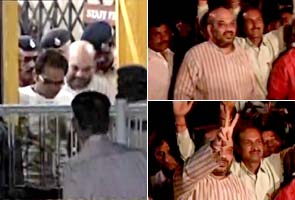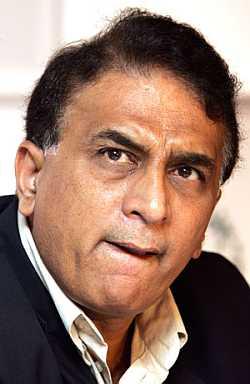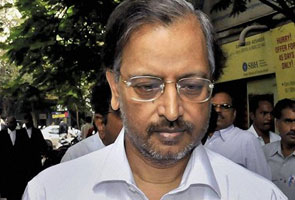President Obama arrives in India this week on a three-day visit amidst high hopes and great expectations, but...
WA S H I N GTO N CHIDANAND RAJGHATTA
Indian Tourism has its “Incredible India”campaign; Barack Obama has his “Indispensable India” mantra. From the time the 44th US president took office, he has flogged this expression several times, elevating it to a new US foreign policy shibboleth. He used it during his remarks to welcome Prime Minister Manmohan Singh to the White House; he plied it during a surprise State Department appearance during the strategic dialogue; and he’s applied it several times in between. You’ll hear more of it when he visits India next week.
It is a recalibration of the Bush-Vajpayee era mantra of “natural allies.” Somewhere down the line, Washington has figured out that India is not cut out to be an ally in the traditional sense. Depending on how one looks at it, India is too independent, too timid, too fractious, too tetchy, too assertive, too moralistic, to make a good ally. So it’s now a “partner.” And in Obama’s eyes, “indispensable.”
Really? What gives? How come? What is it that India offers the US that the world’s superpower (albeit declining) can’t live without? Not cheap goods. China takes the cake (and eats it too). Not oil and gas. Not precious metals, rare earths, or hi-technology. We come up short on all the good stuff. We are not even a gateway to landlocked Afghanistan (like Pakistan is, which makes it temporarily indispensable), and the one time we helped US planes refuel during the first Gulf War, all hell broke loose in India. So what are the reasons India is termed “indispensable”?
Well there are 1.2 billion reasons. It’s called the “market” in Americanese. This is the most attractive thing about India right now for the US. Or, to paraphrase an American expression from not so long ago: ‘It’s our economy, stupid.’A constantly expanding middle-class riding on 8% economic growth into the near future, fuelled by blind Americanstyle consumerist aspiration, hungering for goods, gadgets, and gee-gaws.
Don’t believe it? Some of our best and the brightest staff their labs, universities, think tanks and other centers of excellence. We are the repository of prime human capital.
Incidentally, there was this little tour your correspondent took of the first lady’s vegetable garden in the White House this week. It’s a terrific idea. She wants obese America grow and eat more fruits and vegetables, live healthy, size down, consume less sodas and fast food. Great message. Why then, I asked a White House major domo, is US’ India policy geared towards promoting Wal-Mart, Coca-Cola, Pepsi, McDonalds and other notables of witless, unhealthy living? That is a question, said the curator after clearing an awkward throat, best addressed to the state department.
Indeed, the prime focus of the Obama visit is a dead giveaway if you go by his delegation to India. Absent from the team are secretary of state Hillary Clinton and defense secretary Robert Gates. Accompanying him are commerce secretary Gary Locke and agriculture secretary Tom Vilsack. It’s a sales trip. Of course, the big strategic stuff is also on the table, although it has receded a bit in the face of domestic economic pressures and political expediency. As India’s own economic sinews grow, so does its military heft, and Uncle Sam is all too happy to provide the guns along with the butter to bulk up New Delhi for the role of a regional cop.
The fact that India is a democracy, has no particularly contentious issue with the US, and the two countries have matchless people-to-people ties, provides comfort and confidence to Washington that New Delhi can be trusted to safeguard its security interests in the sea lanes around the Indian Ocean. “Common values” is another expression Obama, Bush and Clinton have flogged.
“The United States values our partnership not because of where India is on a map, but because of what we share and where we can go together,” Obama said in his state department speech. But make no mistake; the map is important. Pakistan, always on the point of imploding, has its foot on the US tacticaljugular going into land-locked Afghanistan. But its strategic carotid runs from the Persian Gulf to the Straits of Hormuz, looping up into the South China Sea towards Japan and Korea — herein lies the heart of 21st century economic traffic.
To secure this is where the US wants help from India and other democracies in the region. This route, says Robert Kaplan, author of newly published “Monsoon: The Indian Ocean and the Future of American Power,” underscores the importance of these nations and bodies of water as the US seeks to check the growing assertiveness of China.
“What I am alluding toward is a very complex, Metternichian arrangement of power,” Kaplan told a Harvard audience last week. “We don't have to interfere everywhere, we just have to move closer to our democratic allies in the region so they can do more of the heavy lifting.” Obama’s India trip is the first stop in this exercise when he can get his mind away from the
economy and jobs.
US: THE SOLE SUPERPOWER GDP: $ 15 trillion (number one in the world)
Per capita income: $ 47,014 (5th highest)
Per capita spending: $ 1,967 (nine times the world average)
Has 17% of the total votes in IMF
Accounts for 40% of the world’s military spending
Permanent member of the UN Security Council (with veto power) N E W D E L H I INDRANI BAGCHI
In 2006, a group of Indian journalists visited a few nuclear facilities in France. At a high-level briefing for the group, a French official said, “France did not impose sanctions on India after the 1998 nuclear tests. And we actually wanted a nuclear deal for you. Why did you not do anything about it?” One of them admitted with rare candour that they couldn't pull off what the Americans could. In another couple of years, the Americans would be pulling all stops at Vienna to clear India's nuclear deal through a sceptical and hostile Nuclear Suppliers Group.
In a nutshell, that’s a good reason for India to need the US — to pull the levers of the global system that makes the world a friendlier place for India, more amenable to the India story.
As Barack Obama heads to India, he is pressing different buttons — he’s the first US president to make it to Indian shores in his first term. Also, he’s probably one of the very few to actually spend three days here, certainly the first to celebrate Diwali in India. But he's also the first president to measure his visit to India by the number of jobs he could create for Americans back home, struggling with a 9.6 % unemployment rate.
For Indians, it's a jaw-dropping moment. The US needs us, say bureaucrats and corporate honchos. For years, the silent Indian mantra used to be, “Yankees go back... and take me with you.” Somewhere, the wheels of fate have turned.
Does India need the US any more? For scores of righteous Indians bred on a diet that Americans are out to “get you”, it's tempting to believe that those days are over. The growing and dynamic India doesn't much care for the US’ alliances in our neighbourhood. The Americans’ appeasement of Pakistan’s terror-army-spy establishment is actually against India’s interests.
And then, you are not sure whether the US will kow-tow or be super-belligerent with China. India is buying US defence equipment, but are we sure that the US is a reliable supplier? Or will they give similar equipment to the Pakistanis and undermine our military edge?
Probably all of the above. But even with this, the US will remain India’s most important partners. One of Manmohan Singh’s top advisers says that “we need the US to invest in India's development.” India is growing rapidly, but it needs many leap-frogging moments if it has to pull hundreds of millions of Indians out of poverty. For that, India’s best partner is still the US.
“We need their market, their technology, their defence equipment, their expertise in diverse fields and their innovation,” says Tarun Das, former mentor of CII. Manmohan Singh, early on, defined the three “Es” that India needed to excel in for that much-needed leapfrogging moment in India’s history: economy, energy and education.
The Indian economy has been on a roll, largely due to the enterprise of India’s dynamic private sector. For that to truly flourish, India needs to build capacities in technology and the culture of innovation that sets the US apart from every other country.
For a long time, India has intellectually logged on to the US education system, which is still the acme of aspiration and achievement for many Indians. As for energy, India moved to the first step of a leap-frogging act in energy, with the nuclear deal. Officials will tell you that for India to go around the world, signing nuclear agreements with impunity, it would need that old-fashioned American power.
From the strategic viewpoint, India’s greatest challenge going forward is China. Very simply, India will not be comfortable in a world run by Chinese rules of the game. A high-level Indian official points out that “we would rather that the world is run on the Washington consensus than the Beijing consensus.”
But for all this, India will never be the kind of pliant “ally" the US has traditionally been used to. And the US is never going to do everything India wants them to do. Indians ask too many questions, Americans set too many conditions. “India can, at best, be a partner, but never an ally. But both countries need to come closer for a stable global order in the 21st century,” says KC Singh, former diplomat.
The US is proud of what it calls “American exceptionalism.” India is equally conscious of its own exceptionalism. That will never make for a trouble-free marriage. But just as a strong, democratic India is in the interest of the US, the obverse is equally true. US strategy thinker Ashley Tellis says, “American strategic generosity towards India remains an investment is its own geopolitical well-being. And India’s success itself, so long as it's not used to undermine US’ vital interests, becomes New Delhi’s strategic bequest to Washington.”India and the US need each other to be strong — for their own good.
INDIA: AN EMERGING POWER GDP growth rate: 8.5% (current)
GDP projection for 2030: $6.6 trillion
Labour force: 440 million (world’s 2nd largest)
Mobile phone users: 600 million (fastest growing market)
Internet users: 81 million (4th largest)
Foreign exchange reserves: $ 284 billion (5th largest)
INDO-US LANDMARKS 1941 | US President Franklin D Roosevelt roots for Indian Independence. He tells British Prime Minister Winston Churchill, “India should be made a Commonwealth at once. After a certain number of years—five perhaps, or ten—she should be able to choose whether she wants to remain in the Empire or have complete independence.” 1949 | Jawaharlal Nehru becomes the first Indian Prime Minister to visit America.
1953 | India and the United States are embroiled in an acerbic dispute over the Battle Act, which bars American aid to any country that traded in strategic goods with China. 1959 | Eisenhower becomes the first American president to visit India. He is received with tremendous enthusiasm. 1960 | America signs a four-year, $1.27 billion PL-480 food agreement with India. 1966 |Indira Gandhi travels to Washington and meets President Lyndon B Johnson. Although billed as a goodwill visit, she admits to an associate that “my main mission is to get both food and foreign exchange without asking for them.” The visit is a success.
1969 | Richard Nixon becomes the second American president to tour India in a visit that’s believed by many to be the least productive by any US president. 1979 | A year after Morarji Desai travels to the US, Jimmy Carter comes to India, visits a village in Haryana, which is later christened “Carterpuri”.
1985 | Rajiv Gandhi goes on his first official tour of America; meets President Ronald Reagan.
2000 | Bill Clinton becomes the fourth American president to come to India in what is termed a “game changer visit.”
2005 | Manmohan Singh visits America and the much debated nuclear deal is signed.
2006 | Bush comes to India, agrees to support India's nuclear power programme.
2009 | Manmohan Singh visits Washington, the first foreign leader to be received as a state guest by the 10-month old Obama administration. Obama terms Singh's visit “akin to Nehru's 60 years ago.”




2006: Bush and Manmohan in New Delhi


















 According to State Transport Minister R Ashok, the City has been selected as a pilot for a Central scheme aimed at integrating the cards for use in all public modes of transport in the country.
According to State Transport Minister R Ashok, the City has been selected as a pilot for a Central scheme aimed at integrating the cards for use in all public modes of transport in the country.





 "We were not aware of Gavaskar's links with the Kochi IPL," Shukla said.
"We were not aware of Gavaskar's links with the Kochi IPL," Shukla said.











